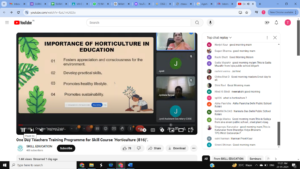Teachers Training Programme for Skill Course ‘Horticulture (816)

On Tuesday, 15 May 2024, Smt. Sunita Madan (Principal SPS Tronica) and Smt. Jyotsna Nagpal (TGT Science, SPS Tronica) addressed the importance of horticulture in education. Horticulture, defined as the art and science of growing plants, plays a crucial role in fostering an appreciation for the environment, developing practical skills, and promoting a healthy lifestyle and sustainability.
The program highlighted the shift towards skill-based learning in horticulture education, moving away from traditional rote learning to a hands-on approach that encourages collaboration, teamwork, and the development of specific competencies.
A significant focus was on microgreens, defined as baby plants between the sprout and baby green stages, known for their high nutrient density, quick growth, and rich vitamin content (E, C, K). These young vegetable greens add flavours and are a potent source of nutrition.
The National Curriculum Framework (NCF) recommendations were discussed, emphasizing the integration of work and education into the curriculum, with a strong focus on vocational education and training.
Smt. Sunita Madan presented the Class XI Horticulture curriculum, covering topics such as site selection for protected cultivation, factors affecting and practicing cultivation, potential crops, greenhouse design, and the use of various substrates in horticulture and floriculture. The program also included innovative projects like class plant adoption, the water hyacinth project, and hydroponic plantations.
Smt. Jyotsna Nagpal outlined the Class XII curriculum, focusing on floriculture in the global market, plant management practices, indoor plant production and maintenance, and employment opportunities in horticulture. She also discussed the scope and need for a skilled workforce, including roles like floriculturists and microgreen technicians.
The event concluded by highlighting the importance of assessing student learning in horticulture and exploring opportunities for teaching staff in the field.


Previous
‘Say Yes to Life, No to Drugs’





















Leave a Reply